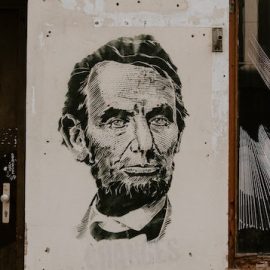

This article is an excerpt from the Shortform book guide to "Liar's Poker" by Michael Lewis. Shortform has the world's best summaries and analyses of books you should be reading.
Like this article? Sign up for a free trial here.
How does Michael Lewis know so much about the Salomon Brothers? What did Lewis witness while working at the firm?
In Liar’s Poker by Michael Lewis, the Salomon Brothers are written about extensively with firsthand knowledge. Fresh out of college in the mid-1980s, Lewis joined the Salomon team, was trained in their philosophy of investing, and then became part of its culture.
Get the inside scoop on what it was like working at Salomon Brothers in the 1980s.
Michael Lewis’s Front Row Seat at the Salomon Brothers
According to Michael Lewis, the Salomon Brothers and many other banks were being pursued by economic students in the 1980s. He writes that along with the stock market, the number of students pursuing economics boomed in the 1980s, despite the fact that—as he would find out—economic theory has nothing to do with the actual work done by investment firms, which focus more on spotting and exploiting opportunities that arise from brief market fluctuations or investor gullibility. His experience applying for jobs in investing also highlights the industry’s hypocrisy, since he learned early on that in order to succeed, he had to pretend that making money didn’t matter. Instead, he had to claim that he was in it for the challenge.
(Shortform note: Lewis’s assertion that economic theory and real-world investing share little common ground is borne out by a plethora of authors—including Robert Kiyosaki, Dave Ramsey, and Tony Robbins—who argue that anyone can succeed at investing whether or not they have an economics background. In A Random Walk Down Wall Street, Burton G. Malkiel takes issue with both leading economic theories regarding the valuation of investments: one claiming that assets have an “intrinsic value” that investors can compute, while the other states that the costs of investments are completely arbitrary. Malkiel argues that economic forecasts based on either of these assumptions are fruitless.)
Once Lewis was hired as a Salomon trainee, he was promised a salary twice as large as what his business professors made. The year was 1985, and Salomon Brothers was rapidly expanding to keep up with the increased demand for their services. Though none of their new hires were loyal to the firm, Salomon’s training did everything it could to indoctrinate recruits into the firm’s way of thinking—that trading was a cutthroat business, the best investment traders were tantamount to sharks, and rank and seniority mattered far less than how much money you could bring in for the business.
Lewis explains that the cutthroat trading culture was baked into Salomon Brothers’ training process. Trainees were pitted against each other in competition for prime work assignments. They were all expected to find mentors in the company—who would either abuse them or else ignore them—and to find ways to make themselves attractive to any departmental managers who might hire them. Humiliation was the point of the process, as was teaching new recruits to be aggressive and conniving in how they landed plum positions in the business. Lewis points out that not all the traders were as awful as the overall culture would suggest—just that concepts such as right and wrong were irrelevant on the trading floor.
| Indoctrination Versus Cultural Fit Salomon’s training practices may have been as counterproductive as they were inhumane. Research on institutional hazing like that which Lewis describes shows that when humiliation is part of the initiation process, it results in less group loyalty, not more. The modern alternative to inculcating recruits into a company culture is “hiring for cultural fit”—the practice of screening candidates for positions based on whether their personalities and values are already aligned with an organization’s culture. In Leading Change, John P. Kotter recommends hiring for cultural fit as a means not merely to preserve an organization’s culture, but also to steer it in a positive direction. But even that practice has come under fire for producing organizations that lean toward conformity rather than diversity. Studies show that in job interviews, selecting candidates based on cultural match may eliminate qualified applicants while reinforcing social class divisions. The alternative to hiring for cultural fit is to hire candidates who bring something new to a company’s culture while avoiding orientation practices that indoctrinate recruits into a previously existing mindset, as Lewis experienced at Salomon Brothers. |
After training, Lewis was assigned to the London office where the focus was more on customer relationships and less on the dog-eat-dog tactics of New York. Nevertheless, European investors had their own brand of fiscal gullibility that Lewis was expected to exploit—in particular, the belief that the future of individual stocks and bonds could be predicted by mapping their past. By the end of the ’80s, Lewis became disabused of the notion that how much money you make reflects your personal worth. He would leave the business of investing entirely, but only after witnessing some of its most dramatic ups and downs.
(Shortform note: Though Lewis criticizes investors for fixating on individual assets’ historical trends, the market as a whole has ups and downs that can be charted with somewhat more accuracy. Ray Dalio, author of Principles: Life and Work, made his name by predicting the 2008 recession and guiding his hedge fund Bridgewater Associates through it relatively unscathed. Dalio’s central thesis is that every financial situation today has already happened at some point in the past and that the future can be charted by studying history. In June 2023, Dalio predicted that the US’s debt cycle, coupled with internal divisions and global instability, points to an oncoming period of economic and political turmoil that will be difficult to navigate at best.)

———End of Preview———
Like what you just read? Read the rest of the world's best book summary and analysis of Michael Lewis's "Liar's Poker" at Shortform.
Here's what you'll find in our full Liar's Poker summary:
- A first-hand account of the pursuit of ill-gotten riches at the Salomon Brothers
- The boom and burst of the mortgage bond market
- Where there is room for ethics and level-headed investing






